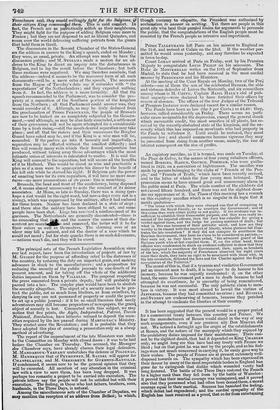The principal acts of the French Legislative Assemblies; since our
last report, have been the introduction of projects of law by M. GUIZOT for the purpose of affording relief to the distresses of the counti7, by reducing the duty on imported grain, and making advances in stock to the manufacturers ; arid a proposition for reducing the security of the public journals to one-fburth of its present amount, and for taking off the whole of the additional duties imposed on them by VILLELLE. The proposal respecting the press emanated from a private deputy, but will probably be passed into a law. The simpler plan would have been to abolish the security altogether. The object of a security must be to pro- tect the public, not so much from libellers, as from swindlers, by denying to any one not possessed of property or credit the power to set up a public journal : if it be so small therefore that needy adventurers may still become proprietors of newspapers, the grand, object of security is lost. Connected with this subject, we may notice that five prints, the Ai gle, Independent, Patriot, Tocsin National, Resolution, have hitherto refused to deposit the secu- rities required by the law passed during MARTIGNAC'S Ministry. They started since the Revolution ; and it is probable that they have adopted this .plan of courting a prosecution only as a cheap method of advertising. The report of the impeachment of the late Ministers was made to the Committee on Monday with closed doors : it was to be laid before the Chamber on Thursday. The accused, the Messager des Chambres says, have already chosen their legal defenders. MANDAROUX-VERTAMY undertakes the defence of POLIGNAC, M. HENNEQUIN that of PEYRONNET, M. SAUZEL will appear for CHANTELAUZE, and M. GRENIREUX for GUERNON-RANVILLE. If condemned, it seems now to be the general opinion that they will be executed. All mention of any alteration in the criminal law with a view to save them, has been long dropped. It was perhaps too romantic a project to be carried into execution. The private letters say the people will not be satisfied but with their execution. The feeling, in those who lost fathers, brothers, sons, husbands, in the Three Days, is natural. Among the miscellaneous acts of the Chamber of Deputies, we ins; mention the reception of an address from Belfast; to which, thobigh contrizy to etiquette, the President was authorized by acclamation to answer in writing. Yet there are people in this great city who beat their puzzled brains for arguments to persuade the public, that the congratulations of the English people must be resented by the French people as intrusive and impertinent.


























 Previous page
Previous page